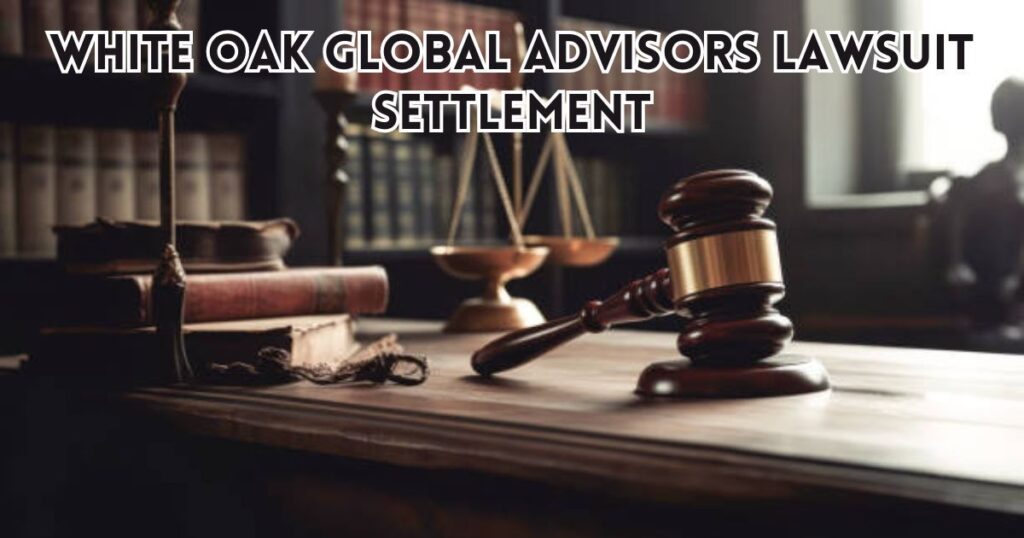White Oak Global Advisors, a prominent financial firm based in San Francisco, has been making waves in the industry since 2007. They’ve carved out a niche by offering direct lending solutions to small and medium-sized enterprises (SMEs) that often struggle to secure capital through traditional banking channels.
Their innovative approach has helped countless businesses grow and thrive over the years.The firm’s reputation took a significant hit when allegations of mismanagement of funds and breaches of fiduciary duty surfaced.
The lawsuit, centered around their handling of the New York State Nurses Association Pension Plan, sent shockwaves through the financial world. It raised serious questions about the firm’s practices and the broader implications for investor trust in the industry.
Overview of White Oak Global Advisors
White Oak Global Advisors has long been known as a go-to source for businesses seeking alternative financing options. Their specialty lies in providing flexible capital solutions to companies that might otherwise struggle to secure funding. This approach has made them a key player in supporting the growth of various sectors across the economy.
Background of the Lawsuit
The lawsuit against White Oak stemmed from accusations that the firm had failed to properly manage investments, particularly those related to the New York State Nurses Association Pension Plan. Investors claimed that the company’s actions (or lack thereof) led to significant financial losses and a troubling lack of transparency in fund management.
Details of the White Oak Global Advisors Lawsuit Settlement

In early 2024, White Oak Global Advisors reached a landmark settlement agreement. They agreed to shell out over $100 million in financial compensation. This massive payout aimed to address allegations of mismanagement and breach of fiduciary duty.
But the settlement wasn’t just about money. White Oak committed to major changes. They promised to overhaul their operations. Compliance became their new buzzword. They pledged to improve oversight across the board. Prevent similar issues in the future.
The impact on stakeholders was huge. Investors got some financial relief, but trust was shattered. White Oak’s reputation took a nosedive. The entire financial industry felt the ripples. It was a wake-up call for similar firms. The message was clear: shape up or face the consequences.
Settlement Agreement
In early 2024, White Oak Global Advisors reached a settlement agreement to resolve the claims against them. The firm agreed to pay out over $100 million in financial compensations to affected investors. This substantial sum was intended to address the allegations of mismanagement and breach of fiduciary duty that had been leveled against the company.
The settlement was not just about the money, though. White Oak also committed to implementing sweeping changes to their operational practices. These changes were designed to enhance compliance measures and improve oversight, with the goal of preventing similar issues from arising in the future.
Impact on Stakeholders
The fallout from the lawsuit and subsequent settlement had far-reaching consequences for everyone involved with White Oak Global Advisors. Investors who had entrusted their funds to the firm were left reeling from the financial losses and breach of trust. The settlement provided some financial restitution, but the damage to confidence was harder to repair.
For White Oak itself, the impact was severe. The firm’s reputation took a massive hit, potentially affecting its ability to attract new clients and retain existing ones. The financial industry as a whole felt the ripple effects, with increased scrutiny being placed on similar firms and their practices.
Read More: Mexico National Football Team vs Honduras National Football Team Lineups
Implications for White Oak Global Advisors

The lawsuit settlement has far-reaching consequences for White Oak. They’ve had to make sweeping operational changes. Stricter compliance measures are now in place. The firm’s undergone a major leadership restructuring. They’re also beefing up their risk management practices. Internal controls are tighter than ever. Regular audits are now the norm.
But that’s not all. White Oak’s under intense regulatory scrutiny. Watchdogs are keeping a close eye on their every move. They’re facing pressure to meet higher industry standards. Any slip-up could spell disaster. The firm’s future outlook is uncertain. They’re walking a tightrope between recovery and ruin. Client trust is fragile. Rebuilding their reputation will be a long, tough journey. White Oak’s resilience is being put to the test.
Operational Changes
In the wake of the settlement, White Oak Global Advisors has been forced to make significant operational changes. They’ve implemented stricter compliance measures to ensure all financial practices meet regulatory standards. The firm has also undergone a leadership restructuring, bringing in new perspectives to strengthen their commitment to ethical management.
Another key focus has been on improving risk management practices. White Oak has introduced more rigorous internal controls and regular audits to prevent future legal issues. These changes are all part of a concerted effort to restore trust and demonstrate a commitment to responsible, transparent operations.
Regulatory Scrutiny
The lawsuit settlement has placed White Oak Global Advisors under intense regulatory scrutiny. Regulatory bodies are now monitoring the firm more closely than ever, ensuring strict adherence to industry standards and legal obligations. This heightened oversight is likely to impact how White Oak operates moving forward, requiring even greater caution and thoroughness in their financial reporting and client interactions.
The increased scrutiny serves as a stark reminder that any future missteps could have severe consequences. It underscores the importance of the operational changes White Oak has implemented and highlights the need for ongoing vigilance in maintaining compliance and ethical standards.
Reputation and Client Trust Post-Settlement
White Oak Global Advisors faces a tough road ahead. The lawsuit settlement dealt a heavy blow to their reputation. Now, they’re scrambling to rebuild trust. They’ve launched new transparency initiatives. These aim to keep clients in the loop. More frequent updates on investments are now the norm. They’ve also overhauled their communication strategies. Clients can now access info more easily. But will it be enough? Some investors might still jump ship. Finding new clients could be an uphill battle. The firm’s market perception has taken a hit. It’ll take time and hard work to recover. White Oak’s future hangs in the balance. Their ability to regain trust will be crucial.
Rebuilding Trust
In the aftermath of the lawsuit settlement, White Oak Global Advisors faces the daunting task of rebuilding trust with clients and investors. They’ve launched several transparency initiatives, providing more detailed and frequent updates on investment performance and company practices.
These efforts aim to give clients greater confidence in how their investments are being managed.White Oak has also overhauled its communication strategies, ensuring that clients and investors are well-informed and have easy access to information about their investments and the firm’s decisions. By being more open and communicative, the company hopes to restore confidence and mend the relationships damaged by the lawsuit.
Long-Term Effects
The long-term effects of the lawsuit settlement on White Oak Global Advisors could be significant and far-reaching. The firm may face ongoing challenges in client retention, as some investors might seek out other financial advisors due to lingering concerns about past management practices. The market perception of White Oak has undoubtedly been affected, and it may take considerable time and effort for the firm to fully recover its reputation.
Lessons Learned for the Financial Industry

The White Oak Global Advisors case offers critical lessons for the financial industry. Ethical practices are non-negotiable. Transparency builds trust. Robust compliance programs are essential. Prioritize client interests always. Fiduciary duty isn’t just legal jargon. It’s a fundamental responsibility.
Risk management should be proactive, not reactive. Internal controls need regular updates. Leadership sets the tone for ethical conduct. Client communication must be clear and frequent. Regulatory scrutiny is intensifying. Adapt or face consequences. Financial penalties can be severe.
Reputational damage lasts longer than fines. Investor confidence is hard to regain once lost. The industry must evolve. Accountability is key to market stability. Learn from others’ mistakes. Stay vigilant.
Importance of Ethical Practices
The White Oak Global Advisors lawsuit settlement serves as a stark reminder of the critical importance of maintaining ethical practices in the financial industry. Transparency, honesty, and robust compliance programs are essential for building and maintaining trust with clients. The case underscores that ethical conduct isn’t just a legal obligation, but a key factor in sustaining long-term relationships and a positive reputation in the market.
Financial firms across the industry would do well to take note of this case and redouble their efforts to ensure they’re operating with the highest levels of integrity. This means not just following the letter of the law, but going above and beyond to prioritize clients’ best interests in all decision-making processes.
Precedents Set by the Settlement
This high-profile settlement sets important precedents that could influence future legal actions against financial firms. The significant financial payout and operational changes imposed on White Oak serve as a warning to other firms about the consequences of mismanagement and breaches of fiduciary duty. It’s likely that this case will lead to stricter regulations within the industry, as regulators seek to prevent similar issues from occurring.
Financial firms may face increased scrutiny and be required to adhere to more rigorous standards to protect investors and maintain market stability. This settlement serves as a reminder that compliance and ethical behavior are not optional extras, but necessary components of doing business in the financial sector.
See Also: Does Costa coffee Support Palestine? Unveiling the Truth
Comparative Analysis of Similar Cases

The White Oak case isn’t unique in the financial world. Other notable lawsuits have shaken the industry. The Belviq lawsuit involved misleading investors about a diet pill’s safety. Wells Fargo faced penalties for creating fake accounts without consent. These cases, like White Oak’s, stress the need for transparency. They’ve led to stricter regulations and higher accountability standards.
Firms now focus more on compliance and risk management. Investor behavior has changed too. People demand more transparency from financial advisors. These lawsuits serve as wake-up calls. They push the industry towards better practices. The goal? Protecting investors and maintaining market integrity.
Other Notable Lawsuits in the Industry
The White Oak Global Advisors lawsuit settlement, while significant, is not an isolated incident in the financial industry. Other high-profile cases have similarly shaken investor confidence and led to substantial settlements.
For instance, the Belviq lawsuit involved accusations of misleading investors about the safety and efficacy of a diet pill, resulting in a large settlement. Similarly, the Wells Fargo case, where the bank was found guilty of creating fake accounts without customer consent, led to massive financial penalties and stricter regulatory oversight.
These cases, much like the White Oak lawsuit, underscore the importance of transparency and ethical practices in the financial industry. They serve as cautionary tales for other firms and highlight the severe consequences of prioritizing profits over client interests and ethical conduct.
Impact on Industry Practices
Lawsuits of this magnitude often lead to significant changes in industry practices. They serve as wake-up calls for other firms, pushing them to review and improve their own compliance and risk management programs. These legal cases also influence investor behavior, making them more cautious and demanding greater transparency from financial advisors.
Over time, such lawsuits drive the industry toward higher standards of accountability, as firms strive to avoid similar legal issues and the associated reputational damage. The outcome of these cases often leads to stricter regulations, which help to protect investors and maintain the integrity of the financial market.
Conclusion
The White Oak Global Advisors lawsuit settlement marks a critical juncture for the firm and the financial industry as a whole. Moving forward, White Oak faces both challenges and opportunities. The firm will need to focus on rebuilding its reputation and regaining the trust of its clients and investors.
This will likely involve continuing to improve its compliance measures, ensuring transparency in all operations, and maintaining strong ethical standards.At the same time, this settlement offers an opportunity for White Oak to demonstrate its commitment to change and to emerge as a stronger, more resilient player in the financial industry.
For investors, this case serves as a reminder of the importance of being vigilant and informed. It underscores the need to thoroughly research and monitor the firms that manage their assets, and to not hesitate in asking questions and seeking detailed information about how their funds are being managed.
Frequently Asked Questions
What was the main reason for the White Oak Global Advisors lawsuit?
The lawsuit primarily stemmed from allegations of mismanagement of funds and breaches of fiduciary duty, particularly regarding the New York State Nurses Association Pension Plan.
How much was the settlement in the White Oak Global Advisors case?
White Oak Global Advisors agreed to pay over $100 million in financial compensation to resolve the claims brought against them by investors.
What changes did White Oak implement after the settlement?
The firm implemented stricter compliance measures, underwent leadership restructuring, and improved risk management practices to prevent future legal issues and rebuild trust.
How has the lawsuit affected White Oak’s reputation in the financial industry?
The lawsuit significantly damaged White Oak’s reputation, potentially impacting their ability to attract new clients and maintain existing relationships in the competitive financial services sector.
What lessons can other financial firms learn from the White Oak case?
The case highlights the critical importance of maintaining ethical practices, robust compliance programs, and transparency in all financial operations to avoid legal challenges and maintain client trust.

